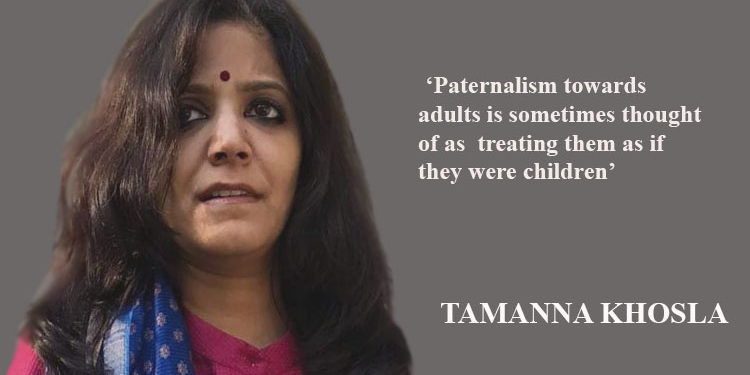The only purpose for which power can be rightfully exercised over any member of a civilized community, against his will, is to prevent harm to others. His own good, either physical or moral, is not sufficient warrant- John Stuart Mill
According to many liberal philosophers, a number of laws are objectionable on the grounds that they are paternalistic. Paternalistic laws include the requirement to wear seat belts and motorcycle helmets, and the taxation of unhealthy food and drink in order to improve public health. Although these laws are plausibly labelled paternalistic, it is important to evaluate the wrongness of paternalistic behavior. According to the dominant view, paternalism is wrong when it interferes with a person’s autonomy. For example, suppose that I throw away your cream cakes because I believe that eating them is bad for your health. This paternalistic action is wrong when it interferes with your autonomous decision to eat cream cakes. On this view, paternalistic behavior is not necessarily wrong when it does not interfere with a person’s autonomy.
Paternalism is action that limits a person’s or group’s liberty or autonomy and is intended to promote their own good. Paternalism can also imply that the behavior is against or regardless of the will of a person, or also that the behavior expresses an attitude of superiority.
The word paternalism is from the Latin pater “father” via the adjective paternus “fatherly”, which in Medieval Latin became paternalism. Some such as John Stuart Mill think paternalism to be appropriate towards children, saying: “It is, perhaps, hardly necessary to say that this doctrine is meant to apply only to human beings in the maturity of their faculties. We are not speaking of children, or of young persons below the age which the law may fix as that of manhood or womanhood.” Paternalism towards adults is sometimes thought of as treating them as if they were children.
SOFT AND HARD
Soft paternalism is the view that paternalism is justified only if an action to be committed is involuntary. John Stuart Mill gives the example of a person about to walk across a damaged bridge. We can’t tell the person the bridge is damaged as he doesn’t speak our language. According to soft paternalism, we would be justified in forcing him to not cross the bridge so we could find out whether he knows about the damage. If he knows and wants to jump off the bridge and commit suicide then we should allow him to. Hard paternalists say that at least sometimes we are entitled to prevent him from crossing the bridge and committing suicide.
PURE AND IMPURE
Pure paternalism is paternalism where the person(s) having their liberty or autonomy taken away are those being protected. Impure paternalism occurs when the class of people whose liberty or autonomy is violated by some measure is wider than the group of persons thereby protected.
Moral and welfare
Moral paternalism is where paternalism is justified to promote the moral well being of a person(s) even if their welfare wouldn’t improve. For example, it could be argued that someone should be prevented from prostitution even if they make a decent living off it and their health is protected. A moral paternalist would argue that it is ethical considering they believe prostitution to be morally corrupting.
Criteria for effective paternalism
Thomas Pogge argues that there are a number of criteria for paternalism.
1.The concept should work within human flourishing. Generally accepted items such as nutrition, clothing, shelter, certain basic freedoms may be acceptable by a range of religious and social backgrounds.
2.The criteria should be minimally intrusive.
3.The requirements of the criteria should not be understood as exhaustive; leaving societies the ability to modify the criteria based on their own needs.
4.The supplementary considerations introduced by such more ambitious criteria of justice must not be allowed to outweigh the modest considerations.
OPPONENTS
In his Two Treatises of Government, John Locke argues (against Robert Filmer) that political and paternal power are not the same.
John Stuart Mill opposes state paternalism on the grounds that individuals know their own good better than the state does, that the moral equality of persons demands respect for others’ liberty, and that paternalism disrupts the development of an independent character. In On Liberty, he writes:
[T]he only purpose for which power can be rightfully exercised over any member of a civilized community, against his will, is to prevent harm to others. His own good, either physical or moral, is not a sufficient warrant. He cannot rightfully be compelled to do or forbear because it will be better for him to do so, because it will make him happier, because, in the opinion of others, to do so would be wise, or even right.
Contemporary opponents of paternalism often appeal to the ideal of personal autonomy.
In society
In the Southern United States before the Civil War, paternalism was a concept used to justify the legitimacy of slavery. Women would present themselves as mothers for the slaves, or protectors that provided benefits the slaves would not get on their own. Plantation mistresses would attempt to civilize their workers by providing food, shelter, and affection. These women would justify that the conditions for freed blacks were poorer than those who were under the mistresses’ protection. Paternalism was used as an argument against the emancipation of slavery due to these mistresses providing better living conditions than the enslaves counterpart in the factory-based north. As a result of this conclusion, the whites would often manage basic rights of the enslaved such as child rearing and property.
Paternalism was also used against women’s suffrage, with opponents of women’s suffrage saying that granting women the right to vote would make their lives harder and separate them from their families. Thus the question arises is as much as possible paternalism of state needs to be reduced.How much of paternalism is plausible is an open ended question.
Writer: Tamanna Khosla completed her Bachelors degree from ladyshriram college. MA and PhD from JNU in political theory. She is an author of three books. Personal laws, globalization and feminist political philosophy.






